江苏大学研究生英语课程讲义整理.
【考研经验】江苏大学学科教学(英语)考研经验

江苏大学学科教学(英语)考研经验分享考研一战成功,初试418分,专业排名第二名,其中政治76分,英语二82分,专业一133分,专业二127分,分享一点点经验,希望可以帮助到大家:首先是政治,我用的是肖秀荣的精讲精练,肖四肖八,肖老的政治押题确实厉害,用完肖老的资料考场上还是比较胸有成竹的。
我在政治上花的时间不是很多,暑假只是刷了一遍选择题,晚上会看下徐涛的政治视频,帮助我加深印象。
我系统的开始复习政治是九月份,到考前肖老的一千题差不多刷了两三遍的样子。
考前的最后两个星期,就是疯狂背诵肖四肖八,尤其是肖四,一定要多备几遍,这样考场上做题才比较得心应手。
其次是英语二,英语二我用的是张剑的黄皮书系列,主要是刷真题,早上会早起背单词。
因为我本身就是英语专业,加上英语二也不是很难,我在英语二上花的时间也不多,在考试前大概刷了三遍真题,背了几篇作文就进了考场。
不过我自己其实对英语二的分数不是很满意,最后没把控好时间,作文写的比较匆忙,丢了不少分,所以大家考场的时候一定要有很强的时间观念,把握好时间,切勿因为时间不够而丢分让自己遗憾。
然后是333教育综合,这门课我应该是花的时间最多的一门,因为这门内容特别多,需要花费大量的时间去理解和背诵。
我用的是某学姐的笔记,结合学校的真题以及视频讲解,将内容整个梳理了一遍然后就是花时间背书,我刚开始也背的比较慢,背书的过程非常辛苦,可是自己坚持下来了就一定会有回报。
在考试前,我一共背了八九遍的样子,最后考试的内容差不多都在自己的预测范围之内。
专业二相比于专业一会简单点,背诵起来不是那么困难,内容后也没有专业一多,我主要是自己买的考研资料加上学校的真题一起背诵的。
以上就是我考研的一点心得,希望可以帮助到学科英语的学弟学妹们!最后祝大家考研顺利!一战成功!。
江苏省考研外国语言文学复习指南英美文学与语言学重点解析
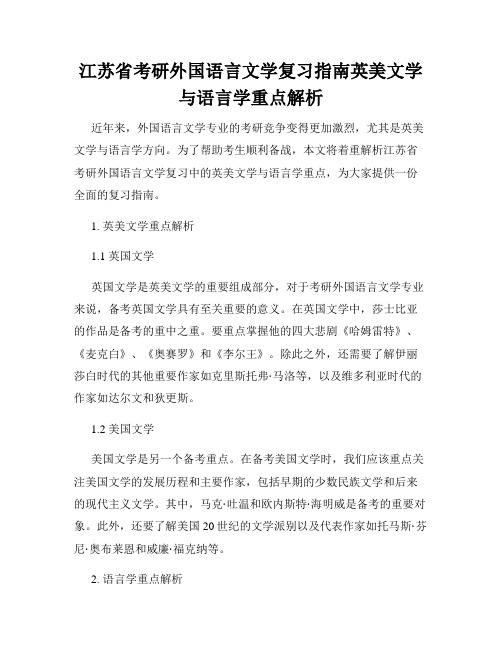
江苏省考研外国语言文学复习指南英美文学与语言学重点解析近年来,外国语言文学专业的考研竞争变得更加激烈,尤其是英美文学与语言学方向。
为了帮助考生顺利备战,本文将着重解析江苏省考研外国语言文学复习中的英美文学与语言学重点,为大家提供一份全面的复习指南。
1. 英美文学重点解析1.1 英国文学英国文学是英美文学的重要组成部分,对于考研外国语言文学专业来说,备考英国文学具有至关重要的意义。
在英国文学中,莎士比亚的作品是备考的重中之重。
要重点掌握他的四大悲剧《哈姆雷特》、《麦克白》、《奥赛罗》和《李尔王》。
除此之外,还需要了解伊丽莎白时代的其他重要作家如克里斯托弗·马洛等,以及维多利亚时代的作家如达尔文和狄更斯。
1.2 美国文学美国文学是另一个备考重点。
在备考美国文学时,我们应该重点关注美国文学的发展历程和主要作家,包括早期的少数民族文学和后来的现代主义文学。
其中,马克·吐温和欧内斯特·海明威是备考的重要对象。
此外,还要了解美国20世纪的文学派别以及代表作家如托马斯·芬尼·奥布莱恩和威廉·福克纳等。
2. 语言学重点解析2.1 英语语音学英语语音学是语言学中的一部分,是考研外国语言文学专业中的重要内容。
备考英语语音学时,需要掌握英语音标的分类和读音规则,了解元音和辅音的区别,以及重点掌握重读音节和非重读音节的规律。
2.2 英语语法学英语语法学是备考考研外国语言文学专业的重点内容之一。
备考时,需要熟悉英语的基本句型和从句结构,了解动词时态、语态和情态动词的用法,以及其他句子成分的语法规则。
2.3 语用学语用学是语言学中的重要分支,关注语言在特定语境中的使用和理解。
备考语用学时,需要了解语言交际的基本原则,包括言外之意、上下文推断、语境依赖等内容。
总结:备考江苏省外国语言文学方向的考研,英美文学与语言学是重点内容。
在备考英美文学时,要重点掌握英国文学和美国文学的发展历程和代表作家,理解他们的作品主题和风格。
(完整版)《研究生英语综合教程》参考资料

Unit One力争第一那晚,我梦见了父亲,不过与其说它是个梦,倒不如说它是我对父亲的记忆。
“第一!不是第二!是第一!"父亲的声音从早餐桌的桌首传来。
我们四个孩子,一边两个,坐在10英尺长的柚木桌两边,神情严肃地专心听着。
母亲坐在桌尾那端,抬头望着父亲,脸上的表情既骄傲又焦虑。
她会不会是觉得无聊呢?那一年是1965年,我12岁。
“你们这些孩子必须得做第一名,而不是第二。
”父亲吼道,他黝黑的面孔因为吼叫而变得更黑了。
他竖起食指和中指,“只能是第……"他这时戏剧性地停顿了一下,在那一刻,他好像一个牧师在祈祷神示,他的四个孩子就像全神贯注听讲的教民,而母亲则像是教堂里虔诚的修女。
“第一。
”当他吼出最后这几个字时,他会弯起他的食指。
我父亲有一双巨大的黑手,修长漂亮的手指上长着椭圆形的指甲,指甲是那么大,好像手指上的风景画一样。
连着指甲根部的甲晕占据了指甲大部分,仿佛要侵蚀、威胁并吞掉指尖,乃至是整只手似的。
我一直想,他之所以当牙医是不是就是想把他那巨大的手指伸到人们嘴里乱搞,让他自己和他的病人们每天为他那精巧的医术所惊叹呢.很多年后,父亲对我说如果有个女人抱着孩子跑来声称他是孩子的父亲,那么他只需看看孩子的手就行了。
假如那双手不大,又没有巨大的指甲和像大海冲刷海岸一般的甲晕,那他就会赶他们走。
以前,我对父亲的记忆就是星期天早上的早餐会和他那双手,食指羞怯地弯着,只有中指竖立出来。
当他大喊“第一名”时,那只中指就好像长大了,挺出来,指着我们,鞭策着我们 -—-—我姐姐,林恩,15岁,我哥哥,史丹利,13岁,我弟弟,拉夫,9岁 -—-- 做到最好,勇争第一。
父亲那洪亮浑厚的嗓音从桌子那端传来,震彻着我们肮脏战栗的身躯。
当我醒来时,我又一次颤抖起来,但这次是因为空调开得太强的缘故.在纽约,空调是个奢侈品,但在华盛顿就是必需品了。
我起来将空调的温度调高了点,看了看米素,点了根烟,想着刚才的梦.我从未和家人去教堂做过礼拜。
江苏大学研究生英语总结--下学期
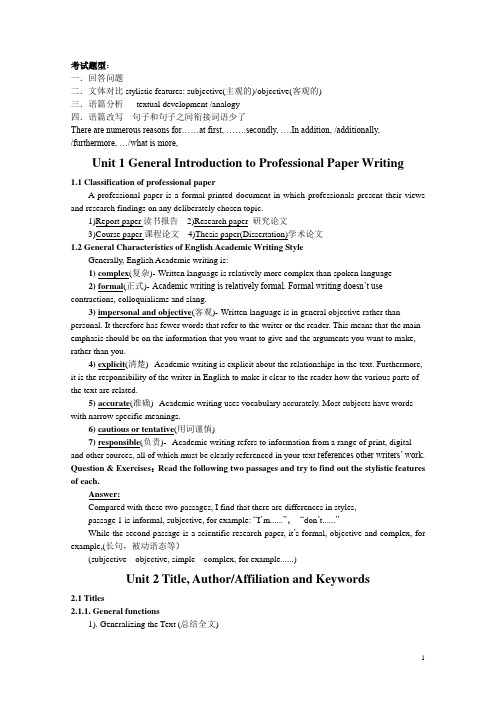
考试题型:一.回答问题二.文体对比stylistic features: subjective(主观的)/objective(客观的)三.语篇分析---textual development /analogy四.语篇改写句子和句子之间衔接词语少了There are numerous reasons for……at first, …….secondly, ….In addition, /additionally,/furthermore, …/what is more,Unit 1 General Introduction to Professional Paper Writing1.1 Classification of professional paperA professional paper is a formal printed document in which professionals present their views and research findings on any deliberately chosen topic.1)Report paper读书报告2)Research paper 研究论文3)Course paper课程论文4)Thesis paper(Dissertation)学术论文1.2 General Characteristics of English Academic Writing StyleGenerally, English Academic writing is:1) complex(复杂)--Written language is relatively more complex than spoken language2) formal(正式)--Academic writing is relatively formal. Formal writing doesn’t use contractions, colloquialisms and slang.3) impersonal and objective(客观)--Written language is in general objective rather than personal. It therefore has fewer words that refer to the writer or the reader. This means that the main emphasis should be on the information that you want to give and the arguments you want to make, rather than you.4) explicit(清楚)--Academic writing is explicit about the relationships in the text. Furthermore, it is the responsibility of the writer in English to make it clear to the reader how the various parts of the text are related.5) accurate(准确)--Academic writing uses vocabulary accurately. Most subjects have words with narrow specific meanings.6) cautious or tentative(用词谨慎)7) responsible(负责)---Academic writing refers to information from a range of print, digital and other sources, all of which must be clearly referenced in your text references other writers’ work. Question & Exercises:Read the following two passages and try to find out the stylistic features of each.Answer:Compared with these two passages, I find that there are differences in styles,passage 1 is informal, subjective, for example: ―I’m......‖,―don’t......‖While the second passage is a scientific research paper, it’s formal, objective and complex, for example,(长句,被动语态等)(subjective---objective, simple---complex, for example......)Unit 2 Title, Author/Affiliation and Keywords2.1 Titles2.1.1. General functions1). Generalizing the Text (总结全文)2). Attracting the Reader (吸引读者)3). Facilitating the Retrieval (方便检索)2.1.2.Linguistic Features做分析题时候,可以根据下面的格式进行分析。
硕士英语Unit1 讲义
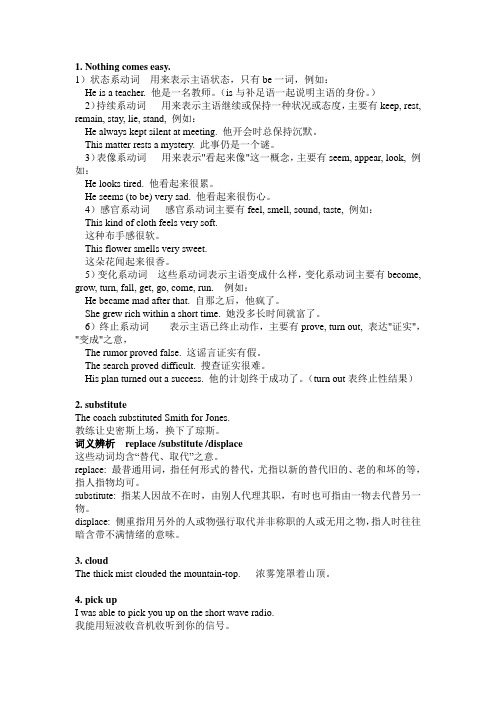
1. Nothing comes easy.1)状态系动词用来表示主语状态,只有be一词,例如:He is a teacher. 他是一名教师。
(is与补足语一起说明主语的身份。
)2)持续系动词用来表示主语继续或保持一种状况或态度,主要有keep, rest, remain, stay, lie, stand, 例如:He always kept silent at meeting. 他开会时总保持沉默。
This matter rests a mystery. 此事仍是一个谜。
3)表像系动词用来表示"看起来像"这一概念,主要有seem, appear, look, 例如:He looks tired. 他看起来很累。
He seems (to be) very sad. 他看起来很伤心。
4)感官系动词感官系动词主要有feel, smell, sound, taste, 例如:This kind of cloth feels very soft.这种布手感很软。
This flower smells very sweet.这朵花闻起来很香。
5)变化系动词这些系动词表示主语变成什么样,变化系动词主要有become, grow, turn, fall, get, go, come, run. 例如:He became mad after that. 自那之后,他疯了。
She grew rich within a short time. 她没多长时间就富了。
6)终止系动词表示主语已终止动作,主要有prove, turn out, 表达"证实","变成"之意,The rumor proved false. 这谣言证实有假。
The search proved difficult. 搜查证实很难。
His plan turned out a success. 他的计划终于成功了。
苏大硕士研究生学位英语教学大纲
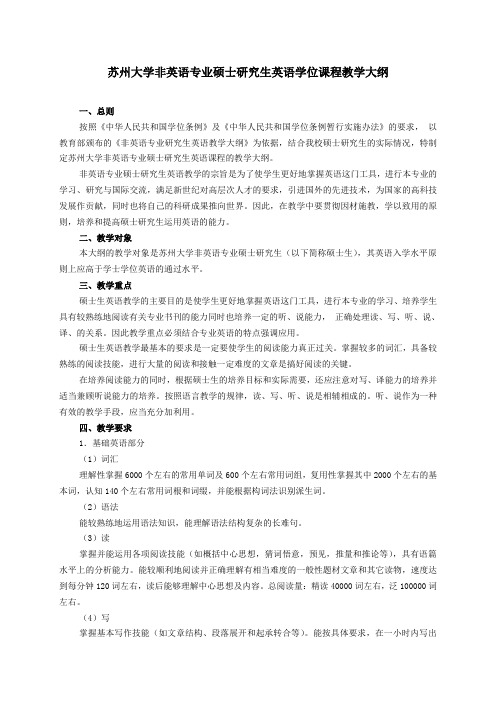
苏州大学非英语专业硕士研究生英语学位课程教学大纲一、总则按照《中华人民共和国学位条例》及《中华人民共和国学位条例暂行实施办法》的要求,以教育部颁布的《非英语专业研究生英语教学大纲》为依据,结合我校硕士研究生的实际情况,特制定苏州大学非英语专业硕士研究生英语课程的教学大纲。
非英语专业硕士研究生英语教学的宗旨是为了使学生更好地掌握英语这门工具,进行本专业的学习、研究与国际交流,满足新世纪对高层次人才的要求,引进国外的先进技术,为国家的高科技发展作贡献,同时也将自己的科研成果推向世界。
因此,在教学中要贯彻因材施教,学以致用的原则,培养和提高硕士研究生运用英语的能力。
二、教学对象本大纲的教学对象是苏州大学非英语专业硕士研究生(以下简称硕士生),其英语入学水平原则上应高于学士学位英语的通过水平。
三、教学重点硕士生英语教学的主要目的是使学生更好地掌握英语这门工具,进行本专业的学习、培养学生具有较熟练地阅读有关专业书刊的能力同时也培养一定的听、说能力,正确处理读、写、听、说、译、的关系。
因此教学重点必须结合专业英语的特点强调应用。
硕士生英语教学最基本的要求是一定要使学生的阅读能力真正过关。
掌握较多的词汇,具备较熟练的阅读技能,进行大量的阅读和接触一定难度的文章是搞好阅读的关键。
在培养阅读能力的同时,根据硕士生的培养目标和实际需要,还应注意对写、译能力的培养并适当兼顾听说能力的培养。
按照语言教学的规律,读、写、听、说是相辅相成的。
听、说作为一种有效的教学手段,应当充分加利用。
四、教学要求1.基础英语部分(1)词汇理解性掌握6000个左右的常用单词及600个左右常用词组,复用性掌握其中2000个左右的基本词,认知140个左右常用词根和词缀,并能根据构词法识别派生词。
(2)语法能较熟练地运用语法知识,能理解语法结构复杂的长难句。
(3)读掌握并能运用各项阅读技能(如概括中心思想,猜词悟意,预见,推量和推论等),具有语篇水平上的分析能力。
江苏大学研究生英语课程讲义分析-翻译doc资料

Unit 11. Put the following sentences into Chinese.1) It was the best of times, it was the worst of times; it was the age of wisdom, it was the age of foolishness; it was the epoch of belief, it was the epoch of incredulity; it was the season of the Light, it was the season of Darkness; it was the spring of Hope, it was the winter of Despair; we had everything before us, we had nothing before us; we were all going to Heaven, we were all going direct the other way.2) A greeting card can warm a heart, hold a hand, lend an ear, pat a back, light up a face, tickle a funny bone, dry an eye, surprise a child, woo a sweetheart, toast a bride, welcome a stranger, wave a good-bye, shout a bravo, blow a kiss, mend a quarrel, ease a pain, boost a morale, stop a worry and start a tradition.2. Put the following passage into Chinese.As an important means for preserving knowledge, various literatures have become precious resources or treasures for the mankind, which have greatly contributed to the social progress of the human race.Professional literatures have been regarded as “intangible assets” of the whole world because they are, on the one hand, the summary, generalization, and development of the achievements obtained on the basis of previous experiences or studies; and on the other hand, they have been accumulated and handed down from generation to generation. In this sense, therefore, all kinds of literature are records of precious research findings and academic achievements, and the crystallization of human civilization.3. Put the following passage into English.翻译的意义是将词句从一种语言转换成另一种语言。
江苏大学研究生英语教材
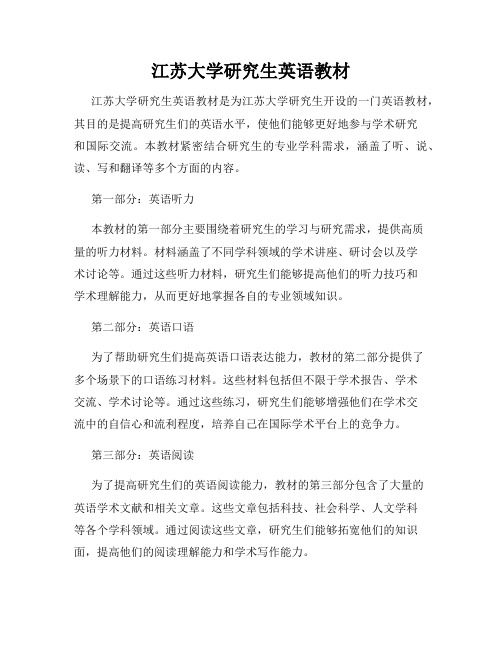
江苏大学研究生英语教材江苏大学研究生英语教材是为江苏大学研究生开设的一门英语教材,其目的是提高研究生们的英语水平,使他们能够更好地参与学术研究和国际交流。
本教材紧密结合研究生的专业学科需求,涵盖了听、说、读、写和翻译等多个方面的内容。
第一部分:英语听力本教材的第一部分主要围绕着研究生的学习与研究需求,提供高质量的听力材料。
材料涵盖了不同学科领域的学术讲座、研讨会以及学术讨论等。
通过这些听力材料,研究生们能够提高他们的听力技巧和学术理解能力,从而更好地掌握各自的专业领域知识。
第二部分:英语口语为了帮助研究生们提高英语口语表达能力,教材的第二部分提供了多个场景下的口语练习材料。
这些材料包括但不限于学术报告、学术交流、学术讨论等。
通过这些练习,研究生们能够增强他们在学术交流中的自信心和流利程度,培养自己在国际学术平台上的竞争力。
第三部分:英语阅读为了提高研究生们的英语阅读能力,教材的第三部分包含了大量的英语学术文献和相关文章。
这些文章包括科技、社会科学、人文学科等各个学科领域。
通过阅读这些文章,研究生们能够拓宽他们的知识面,提高他们的阅读理解能力和学术写作能力。
第四部分:英语写作教材的第四部分旨在帮助研究生们提高英语写作水平。
该部分提供了大量的写作练习题和范文,涵盖学术论文写作、实验报告写作、书评写作等。
通过这些练习,研究生们能够提高他们的写作技巧,培养他们的逻辑思维和论证能力。
第五部分:英语翻译为了培养研究生们的英语翻译能力,教材的第五部分提供了大量的翻译练习题和实践案例。
这些材料涵盖了各个学科领域的学术文献翻译、科技材料翻译等。
通过这些练习,研究生们能够提高他们的翻译技巧和跨文化交流能力。
结语江苏大学研究生英语教材的编写旨在提高研究生们的英语水平和综合素质。
通过多方位的学习和训练,研究生们能够在学术领域中更好地应用英语,为他们未来的学习和科研工作奠定坚实的基础。
这份教材将持续不断地更新和改进,以适应研究生教育的不断发展需求,为培养优秀的研究生做出贡献。
- 1、下载文档前请自行甄别文档内容的完整性,平台不提供额外的编辑、内容补充、找答案等附加服务。
- 2、"仅部分预览"的文档,不可在线预览部分如存在完整性等问题,可反馈申请退款(可完整预览的文档不适用该条件!)。
- 3、如文档侵犯您的权益,请联系客服反馈,我们会尽快为您处理(人工客服工作时间:9:00-18:30)。
Unit 1 General Description of Literature Reading and Translation 1. Definition of LiteratureLiterature is a general term for professional writings in the form of books, papers, and other documentations.2. Classification of Literature1 Textbooks(教科书:In general, a textbook is a kind of professional writing specially designed for the students in a given branch of learning.2 Monographs(专著:A monograph is an artide or short book on one particular subject or branch of a subject that the writer has studied deeply.3 Papers(论文:A complete paper is usually composed of the following elements: title, author, affiliation, abstract, keywords, introduction, theoretical analysis and/or experimental description, results and discussion or conclusion, acknowledgments, references, etc.4 Encyclopedias(百科全书:An encyclopedia is a book or set of books dealing with every branch of knowledge, or with one particular branch, in alphabetical order.5 Periodicals(期刊:A periodical is a series of publications that appear at regular intervals.6 Special Documentation(特别文件:Special documentation refers to all the printed materials that are non-books or non-periodicals.3. Linguistic Features of Scientific Literature1 Stylistically(在文体上, literature is a kind of formal writing.2 Syntactically(在语句构成上, scientific literature has rigorous grammatical structures, andin most cases is rather unitary.3 Morphologically(在词法上, scientific literature is featured by high specialization, the useof technical terms and jargons, unambiguous implication and the fixed sense of the word.4 Besides, non-verbal language is also very popular in various literatures such as signs, formulas, charts, tables, photos, etc.4. Discussion1. What is your opinion on the importance of translation? Can you cite some examples to support your idea?As a means of communication, translation plays an important role in human civilization. for example , in the West, literary translation can be traced back to 300 BC; while in China, recorded translation activities are even earlier, dating from Zhou Dynasty (1100 BC.A modern society sees an extensive use of translation on various occasions. Proper and dexterous translation helps promote mutual understanding between peoples of different culturaland social backgrounds. For example ,the ordinary word “menu”. Its original meaning is “a list of dishes in a meal or to be ordered as separated meals. However, when it is used in computer science, its meaning shifts to “a list shown on the display of a computer from which a user can select the o peration the computer is to perform.”2. What is translation? Do you agree with the author’s point of view? Why or why not?If the word “translation” refers to a subject, it is a science. If it refers to some specific piecesof translation, it is more like an art. If it refers to a process, we may regard it as a craft or skill.Yes, because t he answer depends on how we understand or interpret the word “translation”.3. How is translation generally categorized? Which categories are you familiar with?In terms of languages, translation can be divided into two categories: from native languages into foreign languages and vice versa.In terms of the mode, it can be divided into oral interpretation and written translation.In terms of materials to be translated, there are translation of scientific materials, translation of literary works, etc..In terms of disposal, it can be either full-text translation, abridged translation or adapted translation.4. How do you understand Mr. Yan’s three-word guide xin, da, ya? What’s your opinion on the principles or criteria of translation?Xin, da, ya namely, “faithfulness (信, expressiveness (达, and elegance (雅”. The principles and criteria of translation are actually the two sides of the same coin. On the part of the translator, he or she should follow them while translating; whereas on the part of the reader or critic, he or she may use the principles and criteria to evaluate translation works.Accuracy (准确 and smoothness (流畅.5. What are literal translation(直译and free translation(意译? And what principles should a translator abide by in applying them?Literal translation means not to alter the original words and sentences.Free translation is an alternative approach which is used mainly to convey the meaning and spirit of the original without trying to reproduce its sentence patterns or figures of speech.In the application of literal translation, we should endeavor to rid ourselves of stiff patterns and rigid adherence to translation rules, trying to be flexible; while in the practice of free translation, we should be cautious of subjectivity, avoiding groundless affirmation or arbitrary fabrication.6. What do you know about translation techniques in general? And scientific literature translation in particular?Generally speaking, the basic translation techniques include: (1 Diction (选词用字;(2 Amplification (增益; (3 Omission (省略; (4 Repetition (重复; (5 Conversion (转换; (6 Rearrangement (词译调整; (7 Negation (正说反译,反说正译; (8 Division (长句拆译.Scientific materials stress their preciseness.Unit 2 Professional Papers1. Definition of professional papersA professional paper is a typewritten paper in which professionals present their views and research findings on a chosen topic.2. Classification of professional papers1 Report Paper:The report paper summarizes and reports the findings of another on a particular subject.2 Research paper:A research paper can be intelligent, well informed, interesting, and original in its conclusions.3 Course Paper:Course papers are written after a specific course is learned or are designed at the end of a term, also called “term paper”.4 Thesis Paper:Unlike report papers, the thesis paper takes a definite stand on an issue. A thesis is a proposition or point of view that a writer or speaker is willing to argue against or defend.3. Linguistic Features of Professional Papers1 Formal Style(正式性:A professional paper deals with the study of some objective facts or problems, and the conclusion that is drawn should be based on relevant data, not on personal likes and dislikes. Generally speaking, formal writing sets an unusually high value on objectivity, meticulousness, accuracy, and restraint.2 Specialized Terms(专业性:The terms in professional papers are typically specialized.3 Rigid Sentence Structure(严谨的句式结构:The arguments in professional papers will be concisely and concretely.4 Formatted Elements(固定的内容格式:A complete professional paper usually hasa regular format composed of the following elements: the title, author(s, affiliation(s, abstract, keywords, introduction, body of the paper (theoretical description including calculation, inference, reasoning, conclusion, etc. or experimental description including techniques, methods, materials, results and analysis, etc., acknowledgments, appendices, references or bibliography, etc.4. Discussion1. How is a professional paper defined? What is your understanding of a professional paper?A professional paper is a typewritten paper in which professionals present their views and research findings on a chosen topic.The task of the author of a paper is to read on a particular topic, gather information about it, and report the findings in it. A professional paper must conform to a special format. A professional paper involves the use of library sources from which facts, quotations, and the opinions of others are drawn to explain , support , or authenticate ideas in the paper.2. How are papers classified? What are the similarities and differencesbetween/among them?Report Paper, Research Paper, Course Paper, Thesis Paper.3. What are the linguistic features of professional papers?Formal Style, Specialized Terms, Rigid Sentence Structure, Formatted Elements.4. Where can you search for different kinds of papers from various sources?Journals(期刊/Acta(学报/ Bulletins, Circulars or Gazettes(公告,通告/ Rapid Communications/ Reviews/ Proceedings/ Dissertation Abstract International/ Comprehensive Dissertation Index (CDI(综合报告索引/ On line Access to Dissertation.5. Diction(1This war is becoming the most important story of this generation.(event这场战争将成为这一代人经历的最重大的事件。
